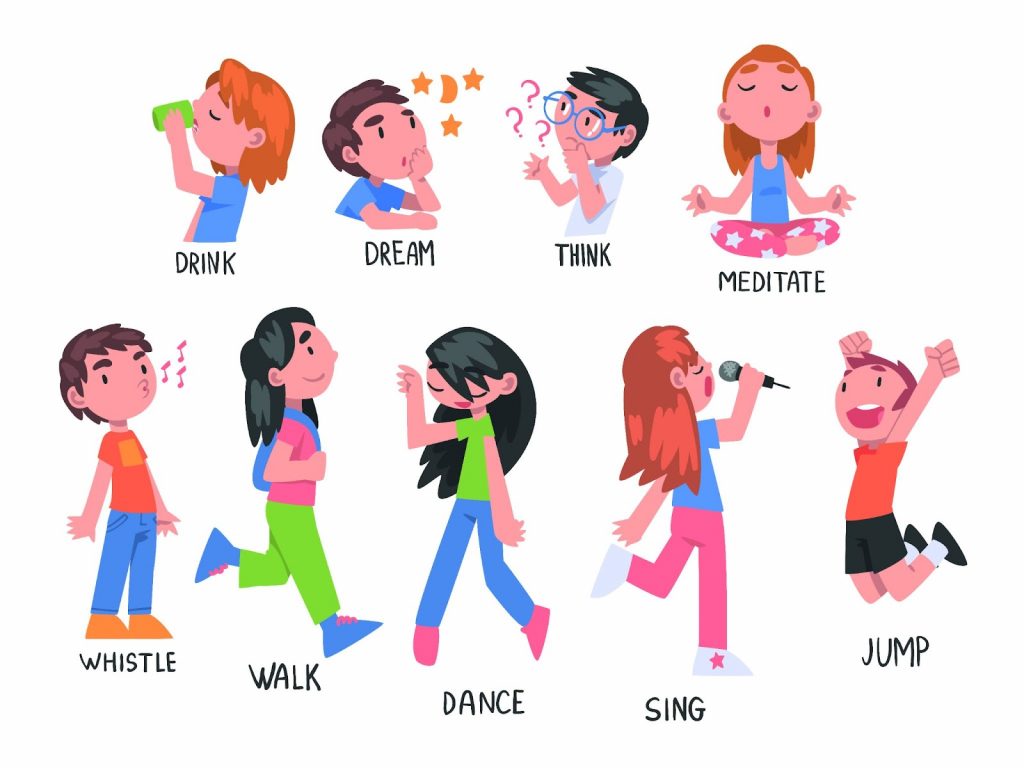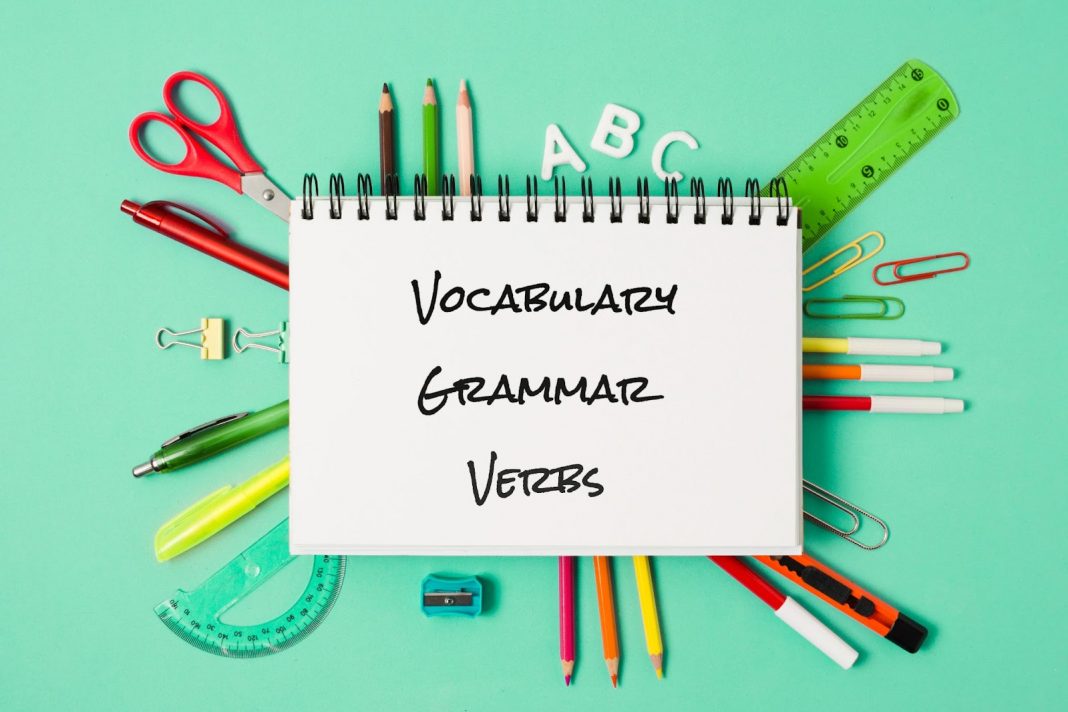We all want our children to be successful in life. While academic achievements are crucial, social skills play an equally vital role in their future success. One powerful way to enhance a child’s social skills is by teaching them about verbs.
Math & ELA | PreK To Grade 5
Kids see fun.
You see real learning outcomes.
Watch your kids fall in love with math & reading through our scientifically designed curriculum.
Parents, try for free Teachers, use for free
Verbs are action words that empower children to communicate effectively, understand sentences, and comprehend instructions. By learning about verbs, children can understand the meaning of sentences better and comprehend stories and instructions more effectively.
In this blog, we’ll explore ten essential social skills you can start teaching your child now, along with a list of English verbs for kids belonging to different age groups.
What Are Verbs?

At the heart of every sentence, question, or command lies a verb – the unsung hero of the English language. Verbs are words that bring life to our language by expressing an action, occurrence, or state of being. Without verbs, sentences would be incomplete and meaningless. Verbs are vital in constructing complete sentences or questions, and they work as the main component of the predicate, which shows what the subject of the sentence does or is.
There are three common types of verbs: action verbs, helping verbs, & linking verbs. These types of verbs vary in how they function and contribute to the meaning of a sentence.
Teaching children about verbs can help them communicate more effectively and build a strong foundation in language arts. Unlike other parts of speech, verbs can change their form to match a sentence’s tense, mood, and voice, making them versatile and essential components of language.
Related Reading: Best Tips & Strategies to Teach English Language
Teaching Verbs: Crucial for a Child’s Language Development
“If you know how to handle the verbs, you know how to handle the language. Everything else is just vocabulary.” -Michel Thomas
- Indeed Teaching kids about verbs is crucial for their language development. Verbs are the backbone of a sentence, providing the necessary action, occurrence, or state of being that brings meaning to the sentence. Without verbs, a sentence is incomplete and lacks clarity.
- Introducing children to verbs at an early age is essential. It helps them build their vocabulary and develop their grammatical skills. A helpful resource for teaching kids about verbs is a list of English verbs specifically designed for kids. With such a list, children can learn and practice using verbs in their everyday language.
- As children grow older and start writing, their foundational knowledge of verbs will help them develop a better sense of grammar, which is essential for writing & communicating more clearly and effectively.
Now that we know how important knowledge of verbs is for children, let’s take a look at an extensive list of verbs used in day to day life which can improve their command of the English language.
List of Verbs For Kids
Here is the list of english verbs for kids that they can get grasp of quickly:
| Eat | Ride a bike |
| Drink | Make a craft |
| Play | Count |
| Sing | Share |
| Sleep | Climb |
| Jump | Kick |
| Give | Swim |
| Write | Draw |
| Turn off | Paint |
| Turn on | Build |
| Dance | Fly |
| Watch TV | Catch |
| Read | Smile |
| Fight | Cry |
| Ride | Hug |
| Laugh | Hide |
| Stand up | Tell a story |
| Sit down | Sharp your pencil |
| Carry | Dance |
| Kneel | Bend |
| Hold | Stretch |
| Sit | Twist |
| Drag | Balance |
| Jump | March |
| Leap | Jog |
| Pick up | Skip |
| Punch | Spin |
| Push | Bounce |
| Run | Wink |
| Lean | Crawl |
| Squat | Blink |
| Throw | Clap |
| Stand | Laugh |
| Make your the bed | Sing a song |
| Go to bed | Feed the pet |
| Wake up | Do homework |
| Brush your the teeth | Listen to music |
| Take a bath | Arrange books |
| Brush your hair | Fold clothes |
| Go shopping | Practice a sport |
| Exercise | Sweep the floor |
| Wash the car | Take a nap |
| Get dressed | Blow bubbles |
| Play with friends | Make a craft |
| Have breakfast | Write a story |
| Have lunch | Draw a picture |
| Have dinner | Send a letter |
| Water the plant | Take a nap |
| Go for a walk | Call your friend |
| Clean the room | Set the table |
| Pack the bag | Play a game |
To help children grasp verb tenses, an activity like “Verb Time Machine” is recommended. Games like this can help children learn past, present, future, and continuous verb tenses. You can check online to find the list of english verbs for kids and help your child learn more and more verbs.`
Related Reading: How To Make Simple Sentences For Kids
Conclusion
Teaching children verbs is essential to their overall development, particularly their social and language skills. Parents and educators can help children communicate effectively and adapt to major life changes by starting early and consistently reinforcing the concept of verbs.
Start exploring educational resources today, such as interactive games, storybooks or create a list of verb examples for kids. By incorporating these resources into daily routines, you can empower your child or students on their literacy journey. Together, we can lay a strong foundation for their language skills and lifelong learning.
Related Reading: What Are Adjectives for Kids? Meaning, Types and Activities
Frequently Asked Questions (FAQs)
How can creating a list of English verbs for kids help?
Creating a list of English verbs for kids helps improve vocabulary and language skills, fostering better communication and comprehension at an early age. It also aids in making language learning engaging and fun, enhancing children’s ability to express themselves confidently.
How can I encourage my child to use new verbs they've learned?
You can encourage your child to use new verbs they’ve learned by incorporating them into everyday conversations, praising them when they use them correctly, and providing opportunities to use them in context.
How can I ensure my child doesn't get bored while practicing verb tenses?
To ensure that your child doesn’t get bored while practicing verb tenses, you can keep the activities short and varied, incorporating those of their interests, and by using positive reinforcement to keep them motivated.
What are some easy verbs for kindergarten?
Here are some easy verbs that are suitable for kindergarten-age children: run, jump, hop, skip, walk, dance, clap, sing, laugh, climb, swing, slide, hide, seek, read, color, eat, sleep and talk.
























